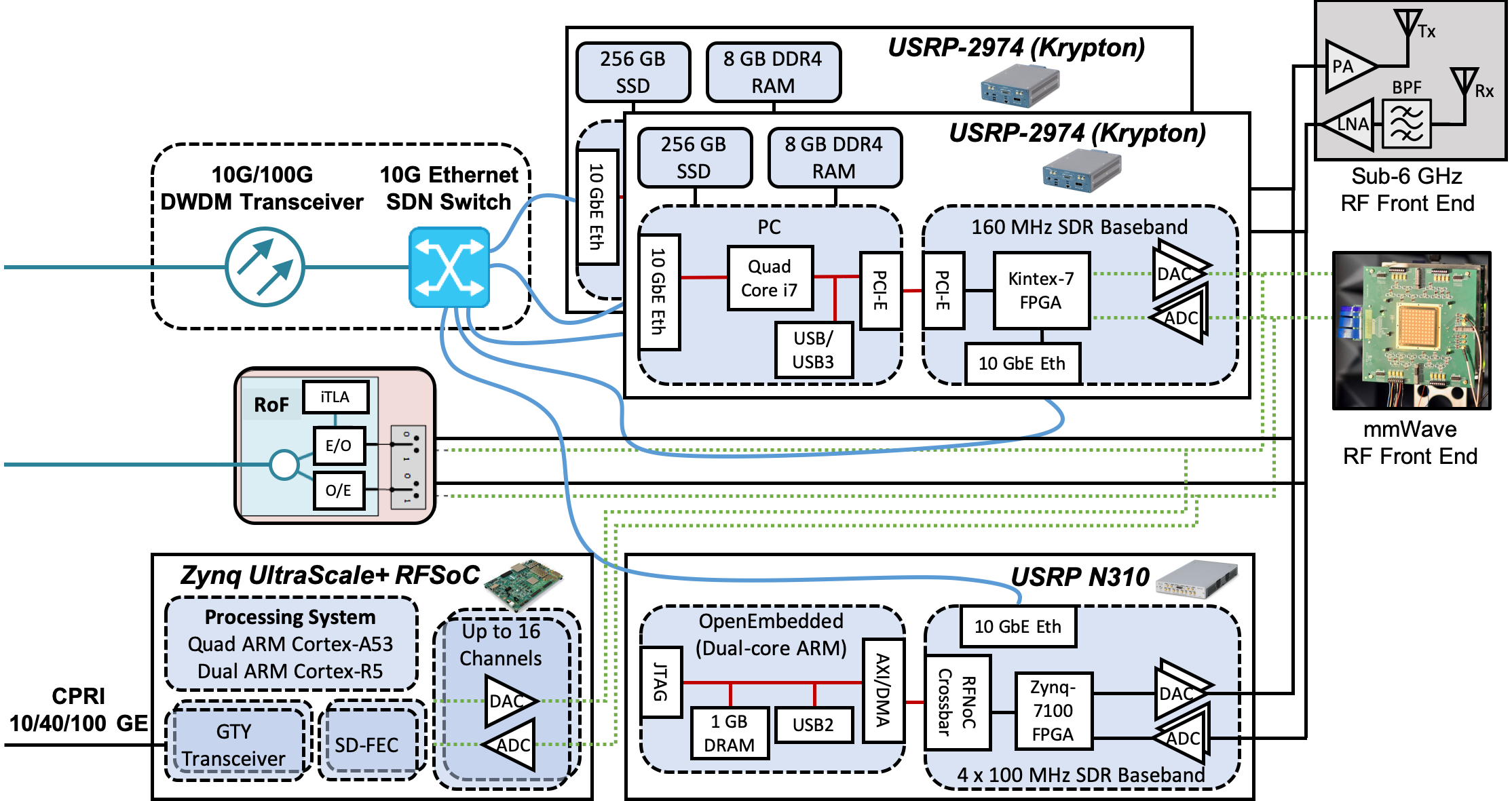Site Navigation
Nodes
Each Node consists of some combination of Software Defined Radios, RF Devices, Compute Resources, and Network and Optical Devices.
They are meant to allow coordinated processing of RF data, from analog tx/rx to digital processing throughout the network.
Multiple Nodes can be combined into larger Topologies, while subsets of a Node can also be used individually.
Details of the connectivity within and between compute resources, SDRs and RF devices can be seen at Architecture/Data Flow.
Types of Node
This table summarizes each type of node, along with the Resources belonging to it.
- Portable and Handheld Nodes are each a single platform.
- Large Portable is a small form factor computer, attached SDR, and battery
- Small Portable is a smaller form factor computer, SDR, and battery
- Handheld is a standalone SDR with ARM processor onboard, as an integrated solution.
| Type | SDRs | Compute | Sectors |
|---|---|---|---|
| Large | N310 & 2974 | Dedicated Servers | 1-3 |
| Medium | N310 & 2974 | Shared Server | 1 |
| Big Portable | B210 | 45W Intel | N/A |
| Small Portable | B205mini | 15W Intel | N/A |
| Handheld | E312 | Embedded ARM | N/A |
Fixed Installation
These Nodes are always connected and available. They have a dedicated fiber plant connecting them to the larger Testbed.
Connectivity between these nodes can be seen under Architecture
Large Node
The large node is composed of one or more "sectors". Each sector is composed of a USRP N310 and USRP 2974 paired to an RF front end and directional antenna.
Additionally, there are several compute resources close by, and attached over fiber for use in close conjunction with the USRPs.
Contents of one large node sector enclosure:
| | |
| USRPs | RF front end |
Medium Node
The medium node is composed of a USRP N310 and USRP 2974 paired to an RF front end and omni-directional antenna.
It is connected over fiber to a shared pool of compute resources. It is conceptually similar to a single sector of a Large Node, although the rf frontend is slightly different.
Contents of one medium node enclosure:
| | |
| USRPs | RF front end |
Portable
Portable Nodes are provisioned while connected to a staging area, and can then be taken out and moved around to conduct experiments. Upon return to the staging area, the results are downloaded for later analysis.
The portable nodes are available in three variants, a trade-off between performance, battery life, and portability.
In progress, are portable nodes permanently installed in mail vans, busses, and other vehicles that travel predicable routes. These will have their own system for experiment control, and result collection.
Large Portable
The large portable node is based on an Intel "Hades Canyon" NUC (8i7HVK) paired with a USRP B210.
| | |
| Front | Rear |
Small Portable
The small portable node is based around an Intel NUC () paired with a USRP B205mini.
| | |
| Front | Rear |
Handheld
The handheld node is based around the completely self contained USRP E312.
This SDR is used in the Handheld portable node.
It has an embedded ARM processor, a small FPGA, an integrated RF frontend, and a battery. This lets it serve as a completely standalone platform.
More information can be found from https://www.ettus.com/all-products/usrp-e312/ Ettus Research
| | |
| Front | Rear |
In addition to the SDR, it can be outfitted with USB devices, such as Wi Fi Dongles or LTE Client devices.
Use cases include using wifi backhaul for data collection or LTE backhaul for wide ranging geographic data sampling.
Attachments (9)
- block_node_diagram.jpg (1.2 MB ) - added by 6 years ago.
- large node rf tray.JPG (2.2 MB ) - added by 6 years ago.
- large node usrp tray.JPG (1.6 MB ) - added by 6 years ago.
- large NUC with B210 - rear.JPG (751.2 KB ) - added by 6 years ago.
- large NUC with B210 - front.JPG (837.6 KB ) - added by 6 years ago.
- small NUC with B205 - rear.JPG (656.1 KB ) - added by 6 years ago.
- small NUC with B205 - front.JPG (609.7 KB ) - added by 6 years ago.
- E312 - rear.JPG (740.5 KB ) - added by 6 years ago.
- E312 - front.JPG (668.2 KB ) - added by 6 years ago.

